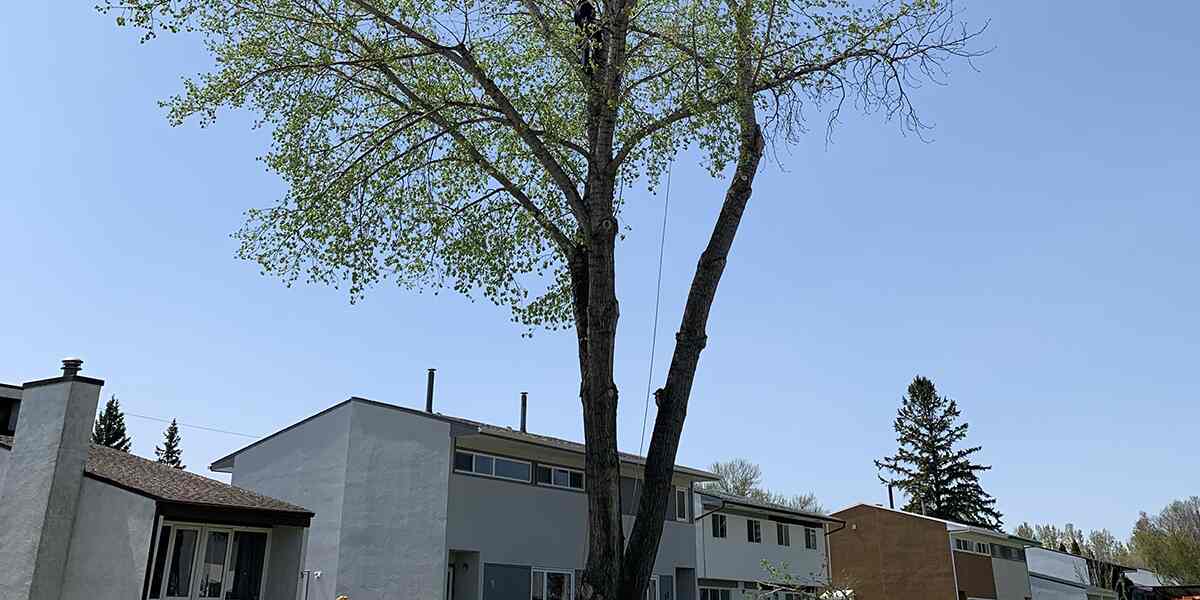
Fungi affect trees in different ways. Some merely mar a tree’s appearance, while others cause premature tree death. Knowing how to identify and treat fungi on trees and understanding the species most at risk can help protect your investment.
As a seasoned tree removal company in Winnipeg, MB, our certified arborists at Mitchel’s All Season Tree Experts understand all too well the value of prompt fungi identification and treatment. In this post, we highlight the main categories of fungi that affect trees and how to treat them.
Vascular Wilts
These types of fungi invade and weaken a tree’s vascular system and interrupt the transportation of water and nutrients. The fatal Dutch elm disease falls into this category of fungi. Spread by elm bark beetles, Dutch elm disease will show up in the form of leaves turning yellow, wilting, curling, and dropping.
Other fungal diseases in this category include oak wilt and verticillium wilt. Oak wilt will primarily attack the red oak, with symptoms of infestation, including browning out of season and leaf drop.
Since the fungus spreads through intertwined root systems, you must remove infected trees, especially if you have multiple oaks on your property.
Verticillium wilt, on the other hand, spreads through the soil. Infected trees experience curling, drying up, yellowing of leaves, and overall slow growth. Verticillium wilt will not respond to fungicides, so you must gear your efforts toward prevention.
Foliar/Shoot Diseases
These types of fungi on trees have varying symptoms, from minor aesthetic damage to entire plant death. Powdery mildew, for example, typically shows as a powdery dusting on leaves.
While not fatal, powdery mildew will ruin the appearance of any plant it affects before the leaves eventually drop. Proper plant spacing and irrigation may help keep powdery mildew at bay.
Another fungus in the foliar class, shot hole fungus, leaves holes on leaves. The holes start as reddish-brown spots before the leaves turn yellow and drop by mid-summer. Shot hole fungus primarily affects cherry trees, leaving them stressed and susceptible to insects and other plant diseases.
Sooty mould, also in the foliar class, indirectly harms trees by depriving them of sunlight. It appears as a black film covering the leaves, effectively stunting the tree’s growth. Neem oil works effectively at controlling the scale insects responsible for the presence of sooty mould.
Root and Butt Rot Diseases
The fungal diseases in this category infect and kill roots, causing often unpredictable root and trunk decay. These diseases can significantly compromise a tree’s structural integrity, resulting in total tree failure.
Canker Diseases
Canker diseases enter the host tree through wounds and branch stubs. Proper pruning techniques play a crucial role in preventing canker diseases.
Treatment and Control
The best way to deal with most fungi on trees involves calling a certified arborist. Even seasoned experts encounter challenges in identifying fungi without sending samples to the lab. Nonetheless, you should focus on prevention.
Maintain healthy trees by watering during periods of drought, exercise proper tree and site selection, and ensure regular fertilization. A certified arborist can help you select an appropriate treatment and control method.
An integrated plant management program that incorporates biological, cultural, and chemical control measures often works best.
Contact Your Local Tree Experts for Help
When you need a tree service company that does its best work with your busy schedule, trust Mitchel’s All Season Tree Experts. We offer several professional tree services, including expert interventions to combat bad bugs for trees and ensure the health of your greenery.
- Tree trimming and pruning
- Tree removal
- Stump grinding
- Hedge trimming
- Arborist inspections and reports
Call us at (204) 998-4559 to request a free estimate for service in Winnipeg. Reach out for more information about the identification and treatment of fungi on trees or to learn about Dutch elm disease.
